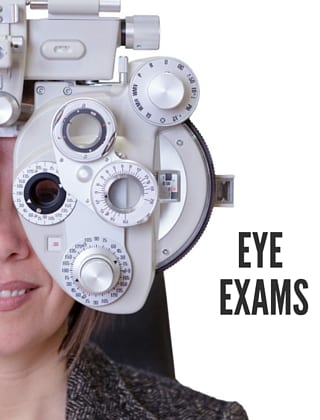Annual comprehensive eye health and vision examinations are important to diagnose eye diseases and many general health conditions.

At Wyomissing Optometric Center we are committed to examining the full health of your eyes and visual system at each comprehensive visit, which is recommended yearly.
What to Expect During an Eye Exam
- An extensive patient history to discuss all known diagnoses you have and medications you are taking. There are many systemic diseases that are known to potentially affect eye health and function. Also, there are many side effects from medications specific to the eyes. We will discuss any questions or concerns you may have about changes to your eyes or with your vision since your last examination.
- Visual acuity is important for monitoring changes to the prescription of your glasses or contact lenses as well as evaluating changes that may occur from eye disease.
- Visual field screening test by Frequency Doubling Technique. This instrument screens peripheral vision which is damaged in eye diseases such as glaucoma and also certain neurological conditions.
- Autorefraction is an objective way to measure a patient’s estimated eyeglass prescription.
- Color vision testing can determine if you are color deficient which can occur either genetically or suddenly due to eye or neurological disease.
- Pupil reaction testing measures the input of your visual system to the brain.
- Eye movement testing measures how accurate and efficient your tracking is. This can be abnormal in a variety of conditions as well as neurological diseases such as brain tumors, stroke or post-concussive syndrome.
- Depth perception measures how your eyes work together as a team. If the eyes have unequal vision or if there is an eye turn (strabismus) the ability to judge depth is diminished.
- Refraction determines your final and most accurate eyeglass prescription. This is also the basis for your contact lens prescription.
- During or after refraction your doctor will also check your eye focusing and eye teaming ability.
- Eye health examination occurs with a special instrument known as a biomicroscope. During this part of the examination, your doctor will examine the full structure and anatomy of your eye from the front surface to the inside of the eye. This includes assessing the health of the eyelids, cornea, conjunctiva, sclera, iris, lens, the fluid inside of the eye, the retina, optic nerve, blood vessels, and more. To best examine the full health of your eyes, a dilated eye examination is recommended. The dilation increases the size of the pupil which allows full views to the retina and interior of your eye. We also offer Optos Optomap screening to assess the internal eye health without dilation for certain patients. Not everyone qualifies for this screening.
It is important to note that most of the above procedures can be performed on any patient — this includes young children, nonverbal patients, and disabled patients.
Dilated Eye Examination vs. Optomap Retinal Imaging
At Wyomissing Optometric Center we also offer Optos Optomap, which is an ultra-wide digital retinal scan that images up to 80% of the retina without dilating eye drops. However, not every patient is a candidate for Optomap. Your candidacy will be determined by your eye doctor based on several factors. Firstly, every new patient that presents to us will need a comprehensive dilated eye examination without exception. With dilation, our doctor can view and assess 100% of your retina in full detail which is important to rule out any ocular or systemic health conditions. The 20% that an Optomap screening misses can mean a delay in diagnosing a sight-threatening retinal finding. It is important to note that if a change is seen on the Optomap screening, we will still recommend a dilated examination that same day to fully assess any concerns.
Although not everyone is a candidate for Optomap, it is a useful “screening” tool that allows otherwise healthy individuals to defer the frequency of dilation. Optomap may be used to photodocument retinal lesions for medical monitoring. We understand that a dilated eye examination is sometimes uncomfortable for patients and the side effects of the drops (light sensitivity and mild blurred vision) last for a few hours. Most importantly, your eye health and the early diagnosis of eye disease outweighs the convenience of an Optomap screening. Optomap is also not covered by insurance and a fee is charged for the service.
If you are interested in having Optomap performed instead of a dilated examination this year, ask your eye doctor if you are a candidate.
National Institutes of Health (NIH) explains a dilated eye exam.

